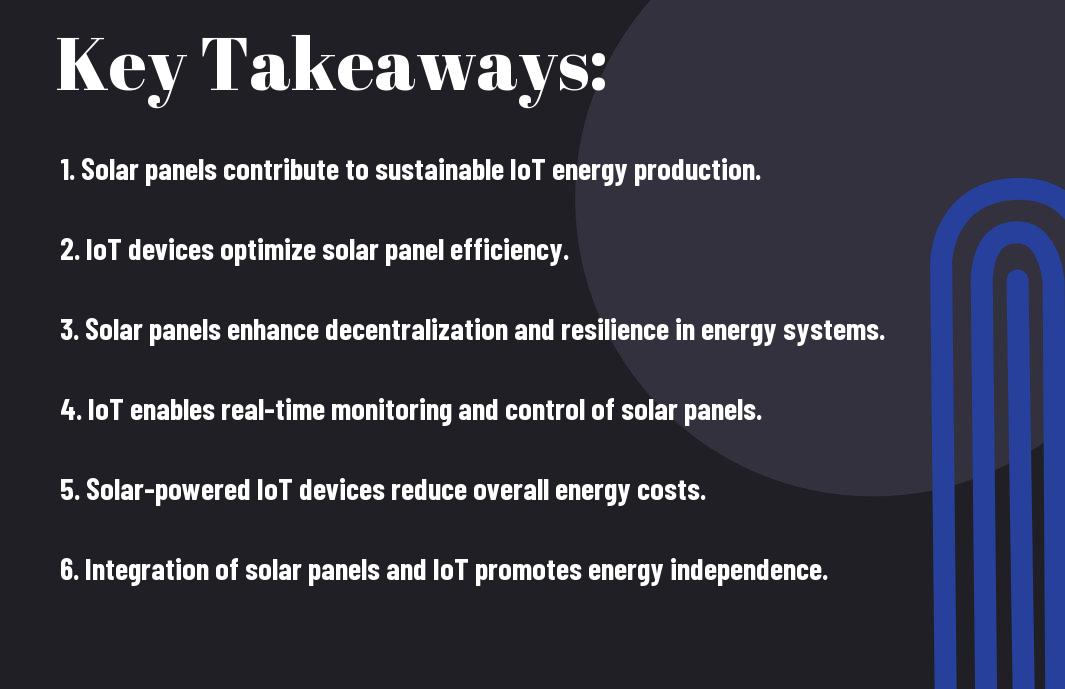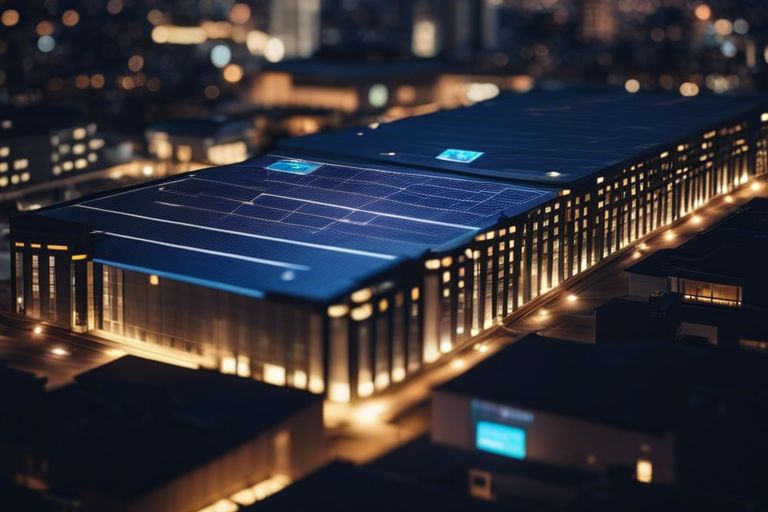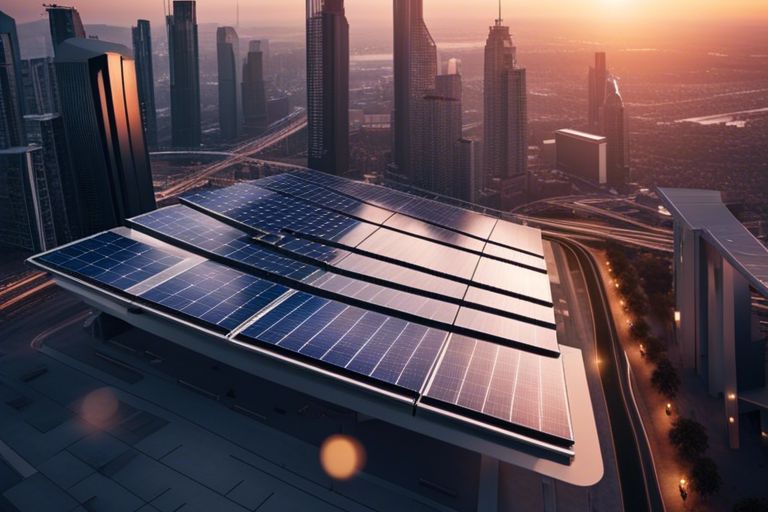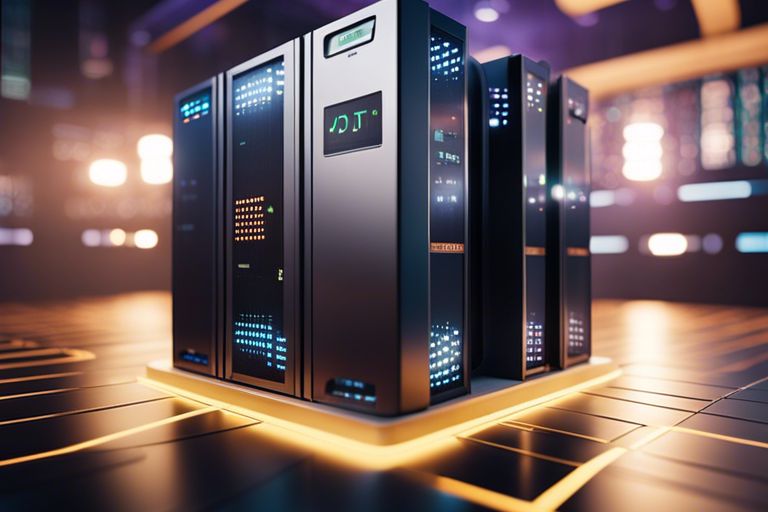It’s a pivotal moment in energy production as solar panels are taking center stage in the IoT era. These innovative panels are revolutionizing the way we harness renewable energy and optimize its efficiency through Internet of Things (IoT) integration. By leveraging real-time data and connectivity, solar panels equipped with IoT technology can adapt to environmental conditions, increase performance, and minimize downtime. This transformative synergy is not only driving sustainability but also reshaping the landscape of energy production towards a brighter, more efficient future.

Interlinking Solar Panels and the IoT
The Smart Grid: An Evolutionary Leap
Clearly, solar panels have revolutionized the way we harness energy from the sun. But their integration with the Internet of Things (IoT) takes this innovation to the next level. The Smart Grid is a concept that involves interconnecting solar panels with IoT devices to create an intelligent and efficient energy distribution network.
Data Analytics and Energy Optimization
Solar panels have the potential to generate vast amounts of data about energy production and consumption. This data can be leveraged through Evolutionary algorithms and machine learning to optimize energy usage, monitor system performance in real-time, and predict maintenance needs to ensure optimal efficiency and reliability.
It is this integration of data analytics and IoT technologies that holds the key to maximizing the potential of solar panels in the IoT era of energy production. By harnessing the power of data analytics, energy optimization becomes more than just a concept – it becomes a reality that can drive significant advancements in renewable energy utilization.
Enhancing Efficiency
While Maximizing Solar Energy Efficiency with IoT has become a crucial aspect of energy production in the IoT era, enhancing efficiency is at the forefront of this advancement.
Machine Learning and Predictive Maintenance
Maintenance is key in optimizing the performance of solar panels. By implementing machine learning algorithms and predictive maintenance protocols, system operators can identify and address potential issues before they escalate, ensuring maximum efficiency and longevity of the solar panels.
Integration with Smart Homes and Cities
With the integration of solar panels with smart homes and cities, the potential for energy optimization and sustainability is immense. Predictive analytics can be utilized to forecast energy demands and adjust solar panel output accordingly, contributing to reduced energy costs and environmental impact.

Challenges and Solutions
The Variable Nature of Solar Energy
Despite the numerous benefits of solar energy, one of the biggest challenges is its variable nature. The amount of sunlight that reaches the Earth’s surface can fluctuate due to factors like weather conditions, time of day, and seasonality. This intermittency poses a challenge for maintaining a consistent energy supply from solar panels.
Security Implications in an IoT-Connected World
Solutions for the security implications in an IoT-connected world are crucial to ensure the integrity of energy production systems. With the increasing interconnectedness of devices in the Internet of Things (IoT) era, the risk of cyber-attacks on solar panel systems grows. Ensuring secure communication channels, implementing robust authentication mechanisms, and regularly updating software are key steps to mitigate these risks.
Nature of the cybersecurity threats in an IoT-connected world is multifaceted. Hackers can potentially access and manipulate sensitive data, disrupt energy production, or even cause physical damage to equipment. It is vital to prioritize security measures in the design and implementation of IoT-connected solar panels to safeguard against these threats.
The Future Landscape of Energy
Technological Synergies and Innovations
To adapt to the ever-evolving energy landscape, technological synergies and innovations are crucial. Not only do they enhance the efficiency of energy production and distribution, but they also pave the way for a more sustainable future. To fully leverage the potential of solar panels in the IoT era, advancements in energy storage, smart grid technologies, and AI-driven analytics are imperative.
Environmental and Economic Impacts
Impacts of integrating solar panels in the IoT era extend beyond environmental benefits to significant economic implications. Solar energy reduces greenhouse gas emissions, mitigating the effects of climate change and promoting a cleaner environment. Furthermore, the decreasing costs of solar panel installations make renewable energy more accessible to individuals and businesses, fostering economic growth and energy independence.
How Do Solar Panels Contribute to IoT Enabled Electric Vehicle Charging Stations?
Solar panels play a crucial role in setting up IoT electric vehicle charging stations. By harnessing the power of the sun, these panels provide renewable energy to fuel the charging stations, reducing reliance on traditional power sources and making the infrastructure more sustainable and environmentally friendly.
To wrap up
Hence, in the IoT era of energy production, solar panels are poised to play a crucial role in revolutionizing the way we generate, store, and manage energy. With advancements in technology and connectivity, solar panels integrated with IoT devices can enable more efficient energy production, consumption, and distribution. By harnessing the power of the sun and leveraging smart technology, we can move towards a more sustainable and resilient energy ecosystem that benefits both individuals and the planet as a whole.
FAQ
Q: What is the significance of solar panels in the IoT era of energy production?
A: Solar panels play a crucial role in the IoT era of energy production by harnessing the power of the sun to generate electricity in a sustainable and environmentally friendly manner.
Q: How do solar panels contribute to the Internet of Things (IoT) in the energy sector?
A: Solar panels in the IoT era are equipped with smart sensors and monitoring devices that enable real-time data collection, analysis, and optimization of energy production and consumption.
Q: What are the benefits of integrating solar panels with IoT technologies in energy production?
A: The integration of solar panels with IoT technologies leads to increased efficiency, cost savings, remote monitoring and control capabilities, and overall improved performance of energy systems.
Q: How do solar panels enhance the sustainability of energy production in the IoT era?
A: Solar panels provide a renewable source of energy that reduces reliance on fossil fuels, decreases carbon emissions, and contributes to a more sustainable and greener energy ecosystem in the IoT era.
Q: What role do solar panels play in shaping the future of energy production and consumption in the IoT era?
A: Solar panels are revolutionizing the energy landscape by driving the transition towards decentralized energy generation, grid modernization, energy efficiency, and the widespread adoption of clean and renewable energy sources in the IoT era.


